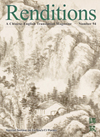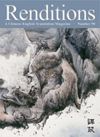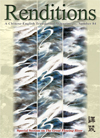| |

Publications: Renditions |
No. 94

|
(Autumn 2020)
This is a general issue featuring a rich collection of poetry. We begin with a special section devoted to the great Song-dynasty poet Lu You 陸游’s ci poems translated by Philip Watson, followed by selected Tang verse celebrating the talents of a woman poet, Shangguan Wan’er 上官婉兒, and two acerbic poems by Meng Jiao 孟郊. Our final poem is of recent vintage, Cai Xin’s 蔡欣 ‘If on an Island-State, an Old Man’ 如果在島國,一個老人. Other highlights include Wang Zengqi’s 汪曾祺 story ‘The Boy Who Fished for People’ 釣人的孩子 and Yu Guangzhong’s 余光中 essay ‘When Spring Comes to the Peninsula’ 春來半島.
Table of contents
Order
|
|
No. 93

|
(Spring 2020)
This issue features an eclectic mix of works by important figures in Chinese literary and cultural history or by contemporary prize-winning authors. Highlights include portions of Wang Tao’s 王韜 diaries that record his journey to Hangzhou in 1858, and Ge Fei’s 格非 fiction ‘Oyster Shells’ 蚌殼, an imaginative tour de force that unfolds considerably psychological complexity.
Table of contents
Order
|
|
No. 92

|
(Autumn 2019)
Renditions no. 92 is a general issue with a special section dedicated to excerpts from Zhang Henshui’s 張恨水 Eighty-One Dreams 八十一夢, a series of fantasies revolving around life in China before, during, and what the author images things might be like after the War of Resistance, beautifully rendered by Simon Schuchat. Other features comprise two pieces published in the same journal in the final decade of the Qing dynasty, one being ‘A New History of Rats’ 新鼠史, an amusing allegory of Chinese weakness and potential for recovery, the other a short and lively satire titled ‘School Inspection’ 查功課 by Wu Jianren 吳趼人.
Table of contents
Order
|
|
No. 91

|
(Spring 2019)
Renditions no. 91 is a general issue featuring a diversity of works originally written in the twentieth century. We begin with a special section devoted to seven relatively little-known short pieces by the extraordinary and tragically short-lived writer Xiao Hong 蕭紅, elegantly rendered by the distinguished translator Howard Goldblatt. Other features comprise Zhu Xiang’s 朱湘 long satirical poem ‘The Cat’s Admonition’ 貓誥, a compact and clever allegory of the disposition of Chinese intellectuals in the immediate post–May Fourth era; ‘The Man from Greece’ 希臘人 by Lin Cantian 林參天, one of our first ventures into publishing translations of literature written in Chinese in South-east Asia; and ‘The Photograph’ 一張照片 by Yeh Hsia-Ti 葉霞翟, the love story of the author and the brilliant Nationalist general Hu Zongnan 胡宗南.
Table of contents
Order
|
|
No. 90

|
(Autumn 2018)
Renditions no. 90 is a general issue featuring a selection of writings from different periods of Chinese history. We begin with excerpts from Meng Jiao's 孟郊 set of poems 'Grief in the Gorges' 峽哀 and three ci poems by Li Qingzhao 李清照. Other highlights comprise Cai Yuanpei's 蔡元培 political allegory 'New Year's Dream' 新年夢, and 'Water and Clouds' 水雲, a long and rather baroque essay by Shen Congwen 沈從文 showing sides of that important author we do not often see. Finally, we offer three stories from contemporary China: Qiao Ye's 喬葉 'Golden Period' 黃金時間, with the focus on the marriage of urban middle-class, Xie Hong's 謝宏 'Who Flies in April?' 誰在四月飛翔, which captures the sad aftermath of the Cultural Revolution, and 'Belle and Grace' 沉魚落雁, a piece by Li Yanfeng 李延風 that offers an upbeat view of life in today's China.
Table of contents
Order
|
|
No. 89

|
(Spring 2018)
Renditions no. 89 is a general issue with a special section devoted to Bo Shaojun’s 薄少君 One Hundred Poems Lamenting My Husband 哭夫詩百首 translated by Wilt L. Idema. Other features comprise Feng Zikai’s 豐子愷 complex meditation on the meaning and function of time, ‘The Gradual’ 漸, followed by one of Lao She’s 老舍 more significant short stories, ‘A New Hamlet’ 新韓穆烈德, together with Lin Wenyue’s 林文月 reminiscence of her childhood in the Japanese-controlled section of Shanghai, ‘Memories of Jiangwan Road’ 江灣路憶往. The issue concludes with two stories that are part of post-1979 ‘new era’ fiction, including G. K. Yuan’s ‘The Martyr’ 被遺忘的烈士 and Xie Hong’s 謝宏 ‘Drifters’ 自游人.
Table of contents
Order
|
|
Nos. 87&88

|
(Spring & Autumn 2017)
Renditions nos. 87 & 88 is entirely devoted to translations of and introductions to works of fiction produced in urban China in the years between 1916 and 1949. In spite of the conspicuous popularity of this work, its variety, and its innovativeness, it was denied appropriate recognition in its own time by the elites that set the tone for what was considered to be proper literature. This negligence has only become worse in the years since 1949, as the work has received very little attention in the critical discourse on modern literature that has flourished in an expanding Chinese academy, particularly in the years since 1980. We hope that by presenting a sampling of the rich variety of fiction from the Republican period, we can make a small contribution to remedying this historical injustice.
Table of contents
Order
|
|
No. 86

|
(Autumn 2016)
Renditions no. 86 features translations of a provocative group of Chinese works, specially featuring the striking, not to mention quite controversial, celebrated poetic prodigy Hai Zi’s 海子 long drama, Sun: Regicide 太陽:弒. Other features comprise Chun Mei and Lane J. Harris’s fine rendering of selections from the novel Illustrious Heroes, A Sequel 續英烈傳, ten poems by Xu Zhimo 徐志摩, as wonderfully translated by Mary M. Y. Fung and David Lunde, and Wang Anyi’s 王安憶 ‘Love Talk at the Hairdresser’s’ 髮廊情話, vigorously co-translated by Hui L. Glennie and John R. Glennie.
Table of
contents
Order
|
|
No. 85

|
(Spring 2016)
Renditions no. 85 is devoted to narratives covering a wide scope of Chinese history. We begin with chapter five from Feng Menglong’s 馮夢龍 seventeenth-century historical novel, Chronicles of the Eastern Zhou Kingdoms. Other features comprise the official biographies of the first six empresses of the Ming Dynasty as recorded in the Mingshi 明史 [History of the Ming dynasty], as written by the historiographers in the Qing dynasty that followed, another excerpt from Chi Pang-yuan’s 齊邦媛 The Great Flowing River, ‘In Ninety-nine Degrees of Heat’ by Lin Huiyin 林徽因, ‘The Innermost Rebellion’ by Xiu Bai 修白, and ‘Fish of the People’ by Su Tong 蘇童.
Table of
contents
Order
|
|
No. 84

|
(Autumn 2015)
Renditions no. 84 is a general issue with a special section devoted to the first two chapters of Chi Pang-yuan’s 齊邦媛epic autobiography, The Great Flowing River, as expertly translated by John Balcom. Other features comprise one more chapter of Erik Honobe’s fine rendering of Feng Menglong’s 馮夢龍 seventeenth-century historical novel, Chronicles of the Eastern Zhou Kingdoms, together with excellent translations of two of the finest poets now writing in Chinese, Yu Jian 于堅and Yang Mu 楊牧 (pen name of Wang Ching-hsien 王靖獻), from mainland China and Taiwan respectively.
Table of
contents
Order
|
|
No. 83

|
(Spring 2015)
Renditions no. 83 is a general issue with a special section on Feng Menglong’s 馮夢龍 Chronicles of the Eastern Zhou Kingdoms 東周列國志. Other features comprise ‘The Xishan Treatise on the Aesthetics of Qin Music’ 谿山琴況 by Xu Shangying 徐上瀛, seven poems of the Qing-dynasty poet Luo Qilan 駱綺蘭, and ‘The Biography of Zhang Tang, from The Book of Han' 漢書‧張湯傳 by Ban Gu 班固.
Table of
contents
Order |
|
Nos. 81 & 82

|
(Spring and Autumn 2014)
Renditions nos. 81 & 82 is a double issue guest-edited by Stephen H. West and Xiaoqiao Ling, devoted to Chinese fiction from the Ming and Qing dynasties. Traditional commentaries are included and presented in a format as close to the Chinese original text as possible. These commentaries contain unique critical insights into the works they treat, and enable new ways of reading premodern Chinese fiction. During much of the last century editors were reluctant to include commentaries in modern editions, but in recent years this work has become much more widely available, with only English translations lagging behind. This special edition of Renditions is meant to move toward closing that gap.
Table of
contents
Order |
|
No. 80

|
(Autumn 2013)
This issue is another collection of writings in various genres and from different periods of Chinese history. We are both delighted and honoured to begin it with the late Professor D. C. Lau’s translation of the ‘Advanced School of Learning’ (Daxue), that foundational Confucian text offering sage advice on self-cultivation that was a moral guide in China for many hundreds of years. Other highlights include a Song dynasty tale of elopement and the resulting court case, and seventeenth century critic Jin Shengtan’s insightful commentary on the Shuihu zhuan. Included also are ‘The History of Humanity’, an important 1907 essay by Lu Xun, a thought-provoking exploration on the differences between Chinese literature and civilization and the Western institutions by the controversial writer and critic Hu Lancheng, followed by ten contemporary poems by Chien Chengchen, and a short story from 1930s Shanghai by the ‘new sensationalist’ Mu Shiying.
Table of
contents
Order
|
No. 79

|
(Spring 2013)
The issue features a selection of work representing a variety of periods and genres of Chinese literature. Highlights include “Lament over My Poor Fate,” an extraordinary long poem of female authorship from the Song dynasty translated by Wilt Idema, a selection of Huang Zunxian’s writings on Japan, translated by Jack Chen and Yunshuang Zhang, followed by a commentary essay by Cheng Yu-yu of National Taiwan University. We will also continue our serialization of David Hull’s translation of Waverings, Mao Dun’s epic of the 1927 revolution.
Table of
contents
Order
|
Nos. 77 & 78

|
(Spring & Autumn 2012)
Chinese Science Fiction:
Late Qing and the Contemporary
This issue showcases representative work of Chinese science fiction from the late Qing and the contemporary. As a popular genre, science fiction has energized modern Chinese literature by evoking a whole array of sensations ranging from the grotesque to the sublime, from the Utopian to the apocalyptic, and from the human to the post-human. It mingles nationalism with fantasy, envelopes politics in scientific discourse, and delivers sharp social criticism with an acute awareness of probabilities and possibilities. Science fiction today both echoes and complicates the late Qing writers' vision of China's future and the transformation of our species and universe, and this special issue aims to contextualize a comparative reading of some important Sci fi writings from these two epochs and the similar expectations and anxieties they bring to Chinese readers.
Table of
contents
Order
|
No. 76

|
(Autumn 2011)
Yang Jiang
In celebration of Yang Jiang's centenary year, this special issue presents a sampling of works from Yang's eight-decade-long career, including new translations of some of her best essays and short stories, as well as excerpts from her first play (Heart's Desire, 1943), her memoirs, and her most recent book, Arriving at the Margins of Life: Answering My Own Questions (2007). Born during the year of the Republican Revolution, Yang Jiang (1911– ) went on to distinguish herself as one of modern China's most accomplished and versatile scholar-writers. Best known for her understated yet often humorous prose style, Yang is also an accomplished playwright and novelist; a prodigious translator from French, Spanish, and English; and an influential memoirist and intellectual who has come to be regarded by many as a paragon of modern Chinese humanism.
Table of
contents
Order
|
No. 75

|
(Spring 2011)
Special Section: The Seventies
This issue focuses on a set of translations from the collection of reminiscences edited by Bei Dao and Li Tuo, The Seventies. A compendium of writings on their experiences of the decade that has proved so pivotal to contemporary China by a large group of writers who lived through it, the work has attracted great attention in the Chinese-speaking world. Also included is a prizewinning translation of the first three chapters of Mao Dun's Waverings, at once the second novella of the Eclipse trilogy, the author's first venture into prose fiction and a key document of the 1927 revolution.
Table of
contents
Order
|
No. 74

|
(Autumn 2010)
This issue begins with a Scots translation of Du Fu's 'Autumn Meditations', accompanied by an essay that reflects on the considerations in translating poetry. A deeply felt eulogy to the late modernist poet from Taiwan, Shang Qin, is written by his friend and fellow writer Wai-lim Yip. Lu Xun's essay 'Lessons from the History of Science' sheds light on the series of events that Chinese thinkers and writers were faced with at the turn of the 20th century. Other features comprise superb translations of three contemporary poets, Han Dong, Genzi, and Wann Ai-jen, an anti-war short story by Xue Yiwei, and a short essay by Bei Dao.
Table of
contents
Order
|
No. 73

|
(Spring 2010)
Special Section: Hong Kong Classical Poetry
The fifty-page special section features the works by twenty-four local poets from the yesteryears, illustrated with historical images of Hong Kong. They portray a pastoral and historically-conscious Hong Kong before she evolved into the fast-moving cosmopolitan city known to the world today. Also included in the issue are excerpts from Yu Jian's travel writing, Liu Yichang's short story, and Li Yu's discourse on food and doctoring.
Table of
contents
Order
|
No. 72

|
(Autumn 2009)
This miscellaneous issue features excerpts from Jin Yong's martial art novel The Smiling, Proud Wanderer, a short story about Japanese expatriates in Taiwan upon their WWII defeat, as well as Li Yu's exposition on the theatre. Also included in the issue are selections of poems by Liu Yong and the Tang-dynasty monk, Jiaoran.
Table of
contents
Order
|
No. 71

|
(Spring 2009)
Chinese Film
Extracts from Chinese film scripts and other texts from the 1930s to this century are included in this issue. They range from The New Woman (1934), starring Ruan Lingyu, to Chunmiao (1975) from the Cultural Revolution, and include a storyboard from Zhang Yimou's Hero (2001). Fei Mu's Spring in a Small Town (1948) is a highlight. The issue will explore whether the literary film script (dianying wenxue juben) is a uniquely Chinese invention, written like fiction but reflecting what we see on the screen. The more usual shooting-scripts of several titles will also be included and pages from them will help illustrate the issue.
Table of
contents
Order
|
| |
|
|
|
|
|





